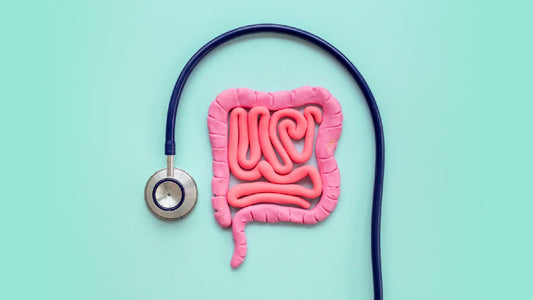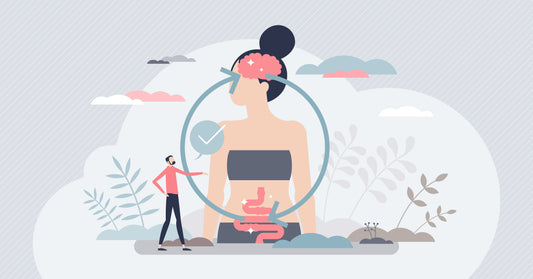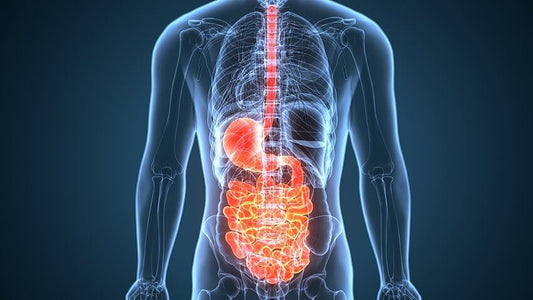Several studies have suggested a bidirectional relationship between the health of an individual’s gut and mental health. Although there are several causes of anxiety, dysbiosis is a significant contributor to neurotransmitter imbalances—but adding a probiotic and cleaning up your diet are simple ways to improve both!
According to research, more than 33% of people will experience anxiety at some point in their lifetime 1. It’s one of the most common mental health disorders, and while there are different levels of anxiety, it can be severely debilitating and impact the quality of life.
But at the same time, digestive issues are just as common—each year in the U.S., there are over 105 million ambulatory care visits for various GI-related diseases 2.
Although anxiety and digestive issues have several root causes, is it surprising that there’s a relationship between them?
If you weren’t familiar with the link between gut health and mental health, we’re exploring the details. We’ll look at the connection between anxiety and gut health and give you our best tips to achieve a healthy gut and reduce anxiety.
What’s The Link Between Anxiety And The Gut?
The relationship between gut health and mental health is a heavy topic, and the whole story is beyond the scope of this article. Still, we’ll give you an overview of the link between anxiety and mental health.
The gastrointestinal system (GI), more commonly referred to as the gut, comprises organs, nerves, hormones, and bacteria that all work together to support digestion.
And while you may think the gut is only involved in digestion, there’s more to it—the brain is directly connected to the gut via the central nervous system (CNS).
The bidirectional relationship between the gut and the brain also involves the autonomic nervous system (ANS), the enteric nervous system (ENS), and the hypothalamic pituitary adrenal (HPA) axis 3.
Within the gut lining, there’s another component of the nervous system that has profound impacts on cognitive function and control: the enteric nervous system (ENS). It is a collection of neurons in the GI tract that forms the “brain of the gut” and can function independently of the central nervous system 4.
It’s home to more than 100 million nerves that control everything from motility and hormone secretions to immune and inflammatory processes. And many researchers believe this link between the brain and the gut profoundly influences mental health, especially anxiety.
A 2015 review published in the Annals of Gastroenterology suggests that the ENS and brain communicate to control various GI processes, linking cognitive and emotional function centers in the brain with specific GI mechanisms 3.
This communication system not only maintains the function of gastrointestinal homeostasis but has multiple effects on things like motivation and higher cognitive functions. It’s believed that the ENS may also be responsible for triggering significant emotional shifts by sending signals to the CNS.
Other evidence shows that the gut microbiota (the bacteria residing in the gut) exert powerful effects on the brain via the gut-brain axis in ways that can influence anxiety.
On top of that, imbalances in neurotransmitters—the brain chemicals that control many physiological functions throughout the body—also play a role in mental health conditions like anxiety, and several neurotransmitters are produced in the gut and regulated by these microbiotas 5, 6.
To round that out, here are seven ways your gut and mental health are connected:
- Your vagus nerve connects the brain to your gut (sends messages from your brain to your colon and vice versa)
- Gut bacteria communicate with the brain via metabolites like short-chain fatty acids (SCFAs)
- Gut inflammation can lead to dysbiosis, which can affect mood
- Butyrate, a SCFA produced in the gut, has positive effects on brain function
- Probiotics have a beneficial effect on brain function; some research finds that Lactobacillus bacteria can improve stress resilience and anxiety 7
- Prebiotics nourish the probiotic bacteria in the gut to maintain diversity
- Gut microbes produce and regulate important neurotransmitters for mental health (GABA, serotonin)
How Does Gut Health Influence Anxiety?
Many studies have focused on the link between gut health and anxiety. The microbes residing in your gut are heavily involved in regulating immune function and energy metabolism, but through the ENS, they also strongly influence cognitive function.
In simple terms, when the body undergoes any stress, it directs energy and resources away from all organ systems toward the muscle and brain. And in doing so, the body releases a cascade of stress hormones that can alter the composition of the gut microbiome.
Chronically elevated cortisol negatively affects brain function, but activation of the HPA axis can also affect the composition of the gut microbiota and increase gastrointestinal permeability 8.
Gut dysbiosis (microbial imbalance) has been proposed as a contributing factor to chronic low-grade inflammation observed in people with GI disorders and mental health issues like anxiety and depression.
Some of the mechanisms by which anxiety and stress can influence gut health (and vice versa) include 9-11:
- Reshaping of the gut microbiota’s composition through stress hormones, inflammation, and autonomic alterations
- Gut microbiota release metabolites, toxins, and neurohormones that can alter eating behavior and mood
- Inflammation triggers the release of cytokines and neurotransmitters, which directly correlate with anxiety and depression
- Gut microbiota influence the function of the hypothalamic-pituitary-adrenal (HPA) axis, which regulates the adaptive stress response
- Gut microbiota regulates the production of essential neurotransmitters like serotonin (95% of serotonin is produced in the gut)
4 Ways To Improve Gut Health And Manage Anxiety
While managing anxiety isn’t always a quick fix, there are several ways you can improve your gut health, which may have positive effects on anxiety. Here are our top recommendations:
1. Clean up your diet
Diet may not be the sole fix for anxiety and gut health, but it can go a long way. A 2018 review published in Current Opinion in Behavioral Sciences suggests that diet plays a significant role in shaping gut bacteria composition, with certain macronutrients having a great impact 9.
They suggest that plant proteins, unsaturated fats, and fiber offer the most benefit for supporting a beneficial balance of bacteria. In contrast, excessive consumption of poor-quality animal protein, saturated fats, and refined or artificial sugars can lead to an unfavorable balance.
Additionally, diets like the Mediterranean diet, which is high in healthy fats, fatty fish, and vegetables, can reduce inflammation, which positively affects mental health and further supports a healthy microbial balance in the gut.
2. Add probiotics and prebiotics
If you want a healthy microbiome, you need to feed it. While probiotic bacteria are helpful for re-establishing balance in the gut, prebiotics are also required to nourish the probiotic bacteria. That means consuming a diet rich in fermented foods like sauerkraut, kimchi, yogurt, and kombucha.
Several studies have explored how probiotics can help restore balance to the gut after it has been disrupted by anxiety and stress.
A 2021 study found that 12 weeks of probiotic supplementation improved the diversity of neurotransmitter-synthesizing/consuming bacteria and some neuroactive metabolites (short-chain fatty acids, GABA, arachidonic acid, etc.) 12.
Their results showed a potential link between probiotic-induced gut microbiota modulation via supplementation and the alleviation of stress/anxiety in adults.
Another study found that supplementation with a Lactobacillus (L.) strain for 12 weeks could alleviate some stress and anxiety in stressed adults, while other studies find that probiotics can improve sleep, autonomic balance, and bowel habits and reduce stress and cortisol levels 9, 13.
But when choosing a probiotic, don’t just go after any old supplements. Because probiotics are delicate, you want to ensure what you’re getting works—and Performance Lab Prebiotic does. It’s a two-in-one prebiotic and soluble fiber stack designed to nourish your body from the inside out.

Rather than introducing new strains of bacteria into the gut, Prebiotic nourishes what’s already there, helping to build a more robust, healthier, and more diverse gut that supports immunity, cognition, mental health, and more.
3. Reduce stress
As we’ve said, stress can majorly impact the composition of the gut, which, in turn, can increase the risk of anxiety. And for most people, stress and anxiety go hand-in-hand.
While it’s not realistic to rid yourself of stress completely, you can take steps to reduce it, which can improve your gut health and anxiety.
The pesky stress hormone cortisol is the key link between stress, anxiety, and gut health. During stressful situations, the body’s sympathetic (fight or flight) system is activated, which ramps up the production of cortisol. Cortisol induces several changes in the body, including in the gut.
When stress becomes chronic, it can increase the permeability of the gut lining, which leads to a host of other issues, including autoimmunity. Additionally, observational studies have found that it is linked to microbiome alterations in humans, although the cause-and-effect relationship isn’t clear 14.
So, how do you reduce your stress? Relaxation techniques! Here are some to try:
- Meditation and mindfulness
- Deep breathing
- Progressive muscle relaxation
- Nature walks
- Exercise
- Visualization
- Drawing, painting, etc.
4. Get enough sleep
Lastly, sleep is a big one for anxiety and gut health—and sleep deprivation is a significant factor in anxiety; lack of sleep can exacerbate anxiety, while anxiety can cause a lack of sleep. It’s a vicious cycle that’s hard to break. But how does sleep impact gut health and anxiety?
New research finds that the connection between gut health and the brain is so strong that it can affect sleep behavior 15. Researchers found that gut microbe depletion eliminated serotonin in the gut.
We know that sufficient serotonin levels in the brain are essential for mood but can also severely affect sleep-wake cycles via its conversion to melatonin, the sleep hormone. As such, altering what microbes are in the gut through diet can help people who struggle with sleep, which, in turn, can relieve anxiety.
Also read: Vitamins for Sleep and Anxiety
References
- Bandelow B, Michaelis S. Epidemiology of anxiety disorders in the 21st century. Dialogues Clin Neurosci. 2015;17(3):327-335.
- Almario CV, Ballal ML, Chey WD, Nordstrom C, Khanna D, Spiegel BMR. Burden of Gastrointestinal Symptoms in the United States: Results of a Nationally Representative Survey of Over 71,000 Americans. Am J Gastroenterol. 2018;113(11):1701-1710.
- Carabotti M, Scirocco A, Maselli MA, Severi C. The gut-brain axis: interactions between enteric microbiota, central and enteric nervous systems. Ann Gastroenterol. 2015;28(2):203-209.
- Goyal RK, Hirano I. The enteric nervous system. NEJM. 1996;334(17):1106-1115.
- Chen Y, Xu J, Chen Y. Regulation of Neurotransmitters by the Gut Microbiota and Effects on Cognition in Neurological Disorders. 2021;13(6):2099.
- Malan-Muller S, Valles-Colomer M, Raes J, Lowry CA, Seedat S, Hemmings SMJ. The Gut Microbiome and Mental Health: Implications for Anxiety- and Trauma-Related Disorders. 2018;22(2):90-107.
- Reis DJ, Ilardi SS, Punt SEW. The anxiolytic effect of probiotics: A systematic review and meta-analysis of the clinical and preclinical literature. PLoS One. 2018;13(6):e0199041.
- Farzi A, Fröhlich EE, Holzer P. Gut Microbiota and the Neuroendocrine System. 2018;15(1):5-22.
- Madison A, Kiecolt-Glaser JK. Stress, depression, diet, and the gut microbiota: human-bacteria interactions at the core of psychoneuroimmunology and nutrition. Curr Opin Behav Sci. 2019;28:105-110.
- Clapp M, Aurora N, Herrera L, Bhatia M, Wilen E, Wakefield S. Gut microbiota’s effect on mental health: The gut-brain axis. Clin Pract. 2017;7(4):987.
- Appleton J. The Gut-Brain Axis: Influence of Microbiota on Mood and Mental Health. Integr Med (Encinitas). 2018;17(4):28-32.
- Ma T, Jin H, Kwok LY, Sun Z, Liong MT, Zhang H. Probiotic consumption relieved human stress and anxiety symptoms possibly via modulating the neuroactive potential of the gut microbiota. Neurobiol Stress. 2021;14:100294.
- Lew LC, Hor YY, Yusoff NAA, et al. Probiotic Lactobacillus plantarum P8 alleviated stress and anxiety while enhancing memory and cognition in stressed adults: A randomised, double-blind, placebo-controlled study. Clin Nutr. 2019;38(5):2053-2064.
- Bailey MT, Dowd SE, Galley JD, Hufnagle AR, Allen RG, Lyte M. Exposure to a social stressor alters the structure of the intestinal microbiota: implications for stressor-induced immunomodulation. Brain Behav Immun. 2011;25(3):397-407.
- Ogawa Y, Miyoshi C, Obana N, et al. Gut microbiota depletion by chronic antibiotic treatment alters the sleep/wake architecture and sleep EEG power spectra in mice. Sci Rep. 2020;10(1):19554.















